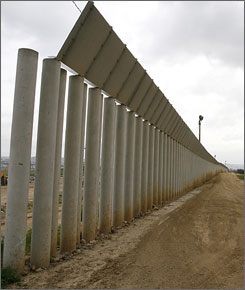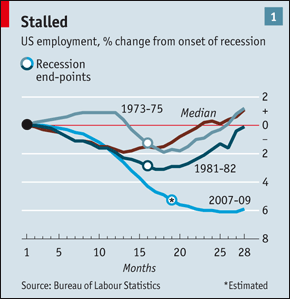
Lexington column in The Economist.
IMMIGRANTS benefit America because they study and work hard. That is the standard argument in favour of immigration, and it is correct. Leaving your homeland is a big deal. By definition, it takes get-up-and-go to get up and go, which is why immigrants are abnormally entrepreneurial. But there is another, less obvious benefit of immigration. Because they maintain links with the places they came from, immigrants help America plug into a vast web of global networks.
So it's not just enjoying all those A Types coming over and interbreeding with us; it's the connectivity they bring.
Bill Easterly likes to write about the "bamboo network" that links countries with large Chinese immigrant pools back to China, something we see with Indians and Chinese, respectively, in Africa today.
America is unique, says Lex, because we don't have much of an expat population abroad but we own "by far the world's largest stock of immigrants, including significant numbers from just about every country on earth." The all assimilate eventually, "but few sever all ties with their former homelands."
It is a huge advantage, our demographic make-up, in a globalizing world, but it speaks to why we, among all the world's nations, rose to our level of power and prosperity and freedom, and THEN chose to spread that economic model around the world in the form of an international liberal trade order-cum-the West-cum-the global economy-cum-globalization.
Classic story told here of Peruvian immigrant to US who builds a biz and then wants to expand it into South America.
To me, this is a no-brainer reason why we want to continue to attract these people, who, on average, are far more entrepreneurial than native borns--and far more networked globally to do something about that ambition.
Lex puts it well:
Immigration provides America with legions of unofficial ambassadors, deal-brokers, recruiters and boosters. Immigrants not only bring the best ideas from around the world to American shores; they are also a conduit for spreading American ideas and ideals back to their homelands, thus increasing their adoptive country's soft power.
Piece ends with Lex asking Obama to follow through on his campaign promise to make America's "cumbersome immigration rules" more efficient in operation. Would take some real courage, but something worth spending political capital on.
Interesting on this score how easily one can lump the US with China and India. It's an old theme of mine: as globalization grows, we find that we have a lot more in common with New Core pillars than Old Core allies, because we remain young at heart, and we're natural globalizers in this age by way of being such an immigrant nation.
 Sunday, May 16, 2010 at 12:04AM
Sunday, May 16, 2010 at 12:04AM 





















